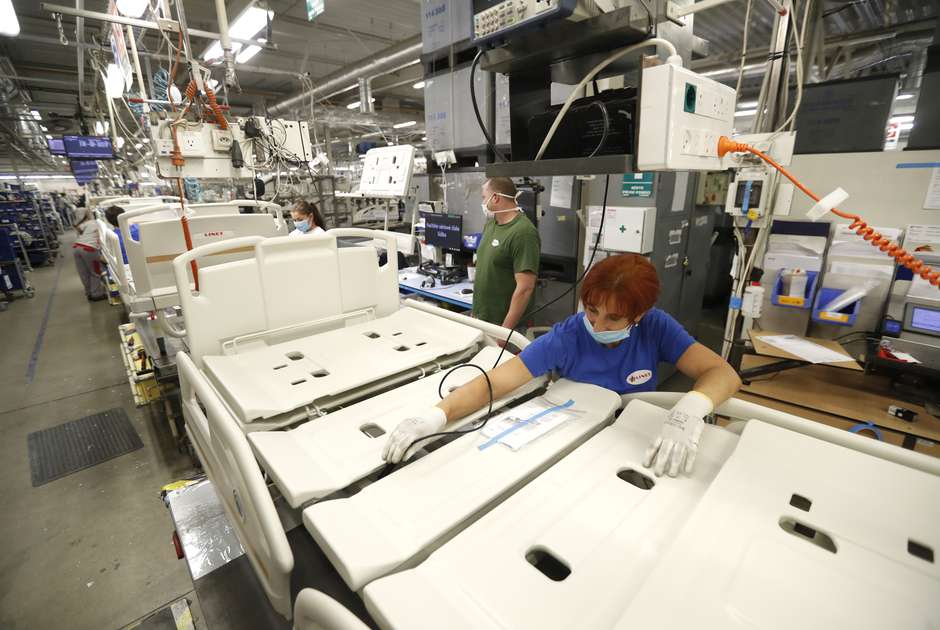Page 5674
Jan 27, 2021
Bruce spent 50 years cataloguing 30,000 edible plants so children do not have to go hungry
Posted by Shailesh Prasad in category: food
Non-profit Food Plant Solutions represents five decades of work by agricultural scientist Bruce French to catalogue more than 31000 edible plants so children do not have to go hungry.
Jan 27, 2021
Here’s the Truly Beastly Helicopter That Might Replace the Black Hawk
Posted by Quinn Sena in category: military

Defiant X can fly twice as far and fast as the greatest helo ever.
The Lockheed Martin-owned Sikorsky and Boeing have rolled out the final specs of their new helicopter, one of two candidates that will replace the U.S. Army’s iconic UH-60 Black Hawk. The Defiant X isn’t just meant to replace the Black Hawk, but also fly up to twice as fast and twice as far, giving Army air assault forces an unparalleled battlefield mobility.
Continue reading “Here’s the Truly Beastly Helicopter That Might Replace the Black Hawk” »
Jan 27, 2021
Tiny bio-inspired swarm robots for targeted medical interventions
Posted by Genevieve Klien in categories: biotech/medical, nanotechnology, robotics/AI
Micro-sized robots could bring a new wave of innovation in the medical field by allowing doctors to access specific regions inside the human body without the need for highly invasive procedures. Among other things, these tiny robots could be used to carry drugs, genes or other substances to specific sites inside the body, opening up new possibilities for treating different medical conditions.
Researchers at ETH Zurich and Helmholtz Institute Erlangen–Nürnberg for Renewable Energy have recently developed micro and nano-sized robots inspired by biological micro-swimmers (e.g., bacteria or spermatozoa). These small robots, presented in a paper published in Nature Machine Intelligence, are capable of upstream motility, which essentially means that they can autonomously move in the opposite direction to that in which a fluid (e.g., blood) flows. This makes them particularly promising for intervening inside the human body.
“We believe that the ideas discussed in our multidisciplinary study can transform many aspects of medicine by enabling tasks such as targeted and precise delivery of drugs or genes, as well as facilitating non-invasive surgeries,” Daniel Ahmed, lead author of the recent paper, told TechXplore.
Jan 27, 2021
Center for Applied Data Ethics suggests treating AI like a bureaucracy
Posted by Genevieve Klien in categories: ethics, robotics/AI
A new research paper suggests AI practitioners adopt anthropology terms to assess large machine learning models that harm people.
Jan 27, 2021
Universal basic income doesn’t impact worker productivity
Posted by Kelvin Dafiaghor in categories: economics, policy, robotics/AI
What do you think Eric Klien.
A universal basic income worth about one-fifth of workers’ median wages did not reduce the amount of effort employees put into their work, according to an experiment conducted by Spanish economists, a sign that the policy initiative could help mitigate inequalities and the impact of automation.
Providing workers with a universal basic income did not reduce the amount of effort they put into their work, according to an experiment conducted by Spanish economists, a sign that the policy initiative could help mitigate inequalities and debunking a common criticism of the proposal.
Continue reading “Universal basic income doesn’t impact worker productivity” »
Jan 27, 2021
Eye-tracking research sheds light on how background music influences our perception of visual scenes
Posted by Genevieve Klien in categories: entertainment, media & arts
According to a new study, the mood of background music in a movie scene affects a person’s empathy toward the main character and their interpretation of the plot, environment, and character’s personality traits. The findings were published in Frontiers in Psychology.
While researchers have long studied the impact of music on human behavior, fewer studies have explored how music can affect a person’s interpretation of film. Study authors Alessandro Ansani and team aimed to explore this by experimentally manipulating the soundtrack of an ambiguous movie scene.
“I’ve always been interested in music and cinema, since I was a baby; my mother told me she used to put me in front of our stereo to calm me down when I was crying, for some reason,” said Ansani, a PhD student at Sapienza University of Rome and research assistant at the CoSMIC Lab.
Jan 26, 2021
How quantum computers could hack our brains with fake memories like Total Recall
Posted by Raphael Ramos in categories: cybercrime/malcode, neuroscience, quantum physics

Well, maybe they would be good memories. 😃
Quantum computers, according to experts, will one day be capable of performing incredible calculations and nearly unfathomable feats of logic. In the near future, we know they’ll help us discover new drugs to fight disease and new materials to build with. But the far future potential for these enigmatic machines is as vast as the universe itself.
Jan 26, 2021
Valve co-founder says brain-computer interfaces will let you ‘edit’ your feelings
Posted by Raphael Ramos in categories: computing, neuroscience
I think this could be one way for Valve to keep its players happy! 😃
Gabe Newell envisions future brain-computer interfaces personalizing video game settings, turning up our focus, and modifying sleep patterns.















